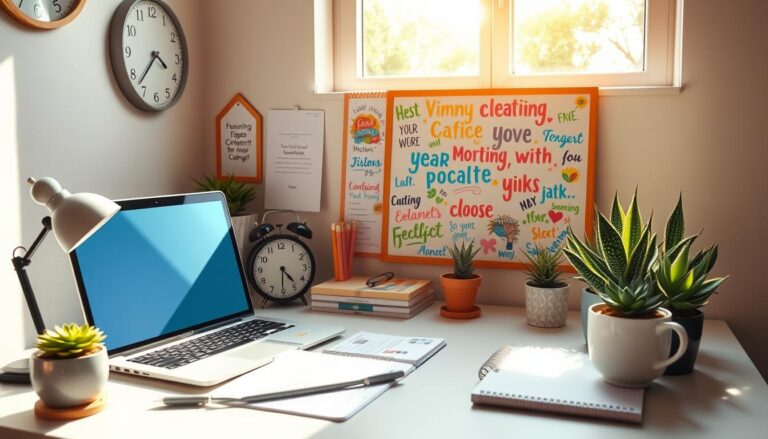5 Simple Ways to Optimize Your Workday for Success
As an entrepreneur, I often feel overwhelmed by the constant demands on my time. Like many of you, I’ve struggled to find the right balance between important tasks and avoiding distractions. But, I’ve found that with a few simple strategies, you can optimize your workday and achieve more success.
10 Simple Ways to Increase Productivity Today
Jack Ma, co-founder of Alibaba, once said, “You should focus on one thing at a time, and do it really well.” This advice really hits home for me. I’ve learned that multitasking often leads to less focus and less efficiency. By focusing on one task at a time, we can avoid distractions, improve our concentration, and get more done.
Proven Goal Setting Techniques for Success
Table of Contents
Key Takeaways
- Focusing on one task at a time can increase productivity and efficiency.
- Prioritizing tasks based on importance and urgency can help you tackle the most critical work first.
- Taking regular breaks can refresh your mind and boost your focus.
- Implementing the two-minute rule can help you quickly complete small tasks and prevent them from piling up.
- Time-blocking can enhance your concentration and reduce the impact of distractions.
Understanding the Importance of Optimizing Your Workday
In today’s fast-paced world, optimizing your workday is key. It boosts your productivity, work-life balance, and well-being. By focusing on efficiency and effectiveness, you can do more in less time. This keeps your personal and work life in balance.
What is Workday Optimization?
Workday optimization means planning and managing your daily tasks and environment. It’s about setting clear goals, prioritizing tasks, and creating a workspace that works for you. It also involves using time management techniques to stay focused.
Benefits of a Well-Optimized Workday
- Increased focus and productivity: By focusing on what’s most important, you can do more and achieve more.
- Improved time management: Good workday optimization helps you manage your time better. This means you can finish tasks on time and take breaks when needed.
- Reduced stress and better work-life balance: A well-organized workday reduces stress. It also gives you more time for personal activities, improving your work-life balance.
- Enhanced work quality: Working on a few key tasks at a time leads to better work. You’ll feel more accomplished.
- Increased job satisfaction: Feeling in control of your work boosts job satisfaction. It motivates you to do your best.
By using effective workday optimization strategies, you can make the most of your time. This leads to better efficiency, a healthier work-life balance, and more fulfillment in your career and personal life.
Set Clear Goals for Each Day
Starting your day with clear goals is key to being productive. Use the SMART framework – Specific, Measurable, Achievable, Relevant, and Time-bound. This helps you set goals that guide your work and keep you focused.
This method makes sure your daily tasks match your long-term goals. It’s a smart way to plan your day.
Prioritizing Tasks: What’s Urgent vs. Important?
After setting SMART goals, it’s time to sort your tasks. Some tasks are urgent, while others are more important. Knowing the difference is crucial for better time management.
Start with tasks that are both urgent and important. Save easier tasks for when you’re less energetic. This way, you use your best energy for the most important tasks.
Make a to-do list the night before. This helps you begin the day with a clear plan. It saves you from spending too much time deciding what to do first.
| Urgent Tasks | Important Tasks |
|---|---|
| Deadline-driven projects | Strategic planning |
| Client emergencies | Professional development |
| Unexpected crises | Relationship building |
By setting clear goals and focusing on what’s urgent and important, you can make the most of your day. Good time management is the secret to reaching your goals.
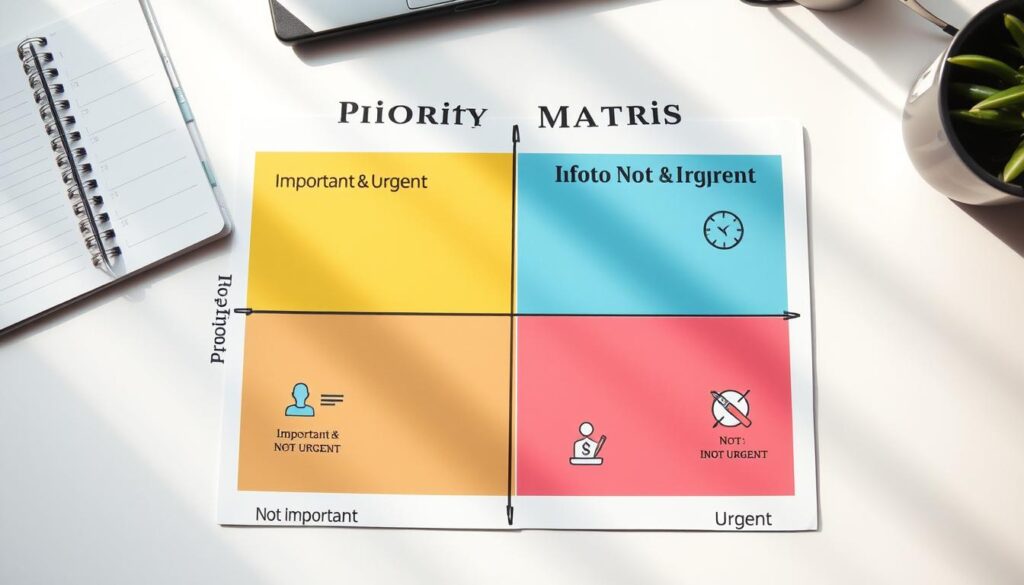
Create a Personalized Work Environment
Start optimizing your workday by making your workspace your own. Organize it for the best productivity and think about comfort and lighting. This will help you work more efficiently and have a better day.
Organizing Your Workspace for Productivity
Arrange your workspace with care. Get rid of clutter and distractions. Make sure you have everything you need right there.
Choose ergonomic furniture and tools to support your comfort. A tidy, organized space helps you stay focused and efficient all day.
The Role of Comfort and Lighting
Your workspace’s setup affects your productivity. Make sure it’s comfy with adjustable chairs and good lighting. Studies show that being active in the morning boosts your mood and work.
Being flexible with your work hours can also make you more productive. Companies like Google and Uber have invested in great office spaces to help their teams work better.
Float’s No FOMO Week shows how important it is to balance work and life. It’s a week where everyone takes a break from work.
Creating a personalized workspace is key. Try out different setups to see what works for you, whether you’re in an office or working from home. A space that meets your needs helps you succeed in your workday.
Utilize Time Management Techniques
Effective time management is key to a better workday. By using proven methods, you can do more in less time. This makes your day more productive.
The Pomodoro Technique
The Pomodoro method is a great way to work. It involves 25-minute focused sessions, called “Pomodoros,” with short breaks in between. This keeps you focused and stops distractions.
Studies show it reduces burnout and keeps you motivated. It’s a simple yet powerful technique.
Time Blocking for Enhanced Focus
Time blocking is another effective strategy. It involves setting specific times for tasks. This helps you avoid interruptions and stay focused.
It’s especially good for hard tasks. It lets you work without breaks. Research shows it can make you more productive.
Setting Time Limits on Tasks
Setting time limits on tasks is also helpful. The 50/10 rule is a good example. Work for 50 minutes, then take a 10-minute break.
This keeps you moving and avoids procrastination. It’s better than multitasking, which can lead to mistakes.
Using these strategies can make your workday better. It helps you stay focused and productive. Remember, managing time well is essential for success.
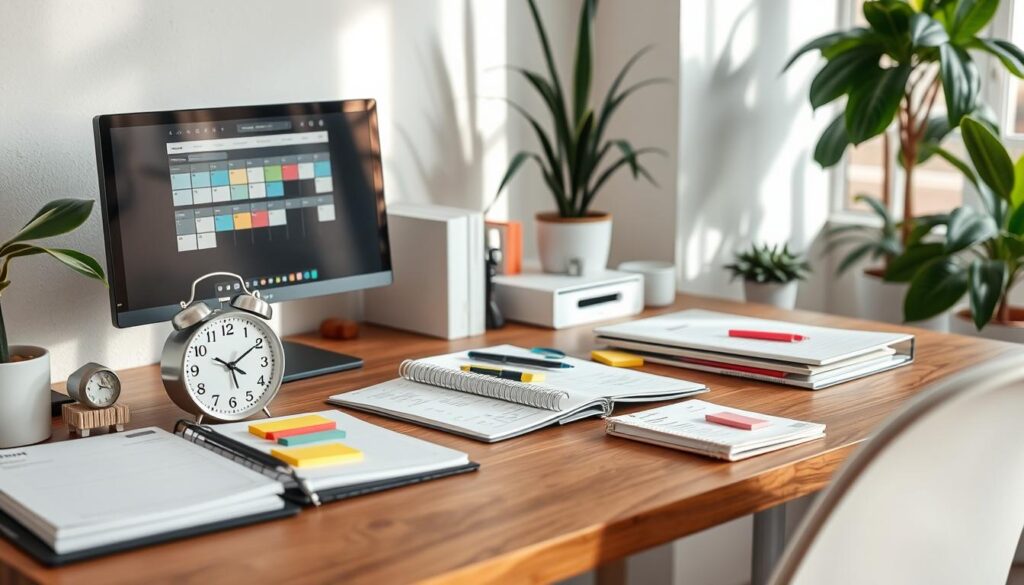
“Time management is not about getting more things done, it’s about getting the right things done.” – Cal Newport
Limit Distractions in the Workplace
In today’s fast-paced digital world, constant notifications and interruptions can really slow you down. It’s key to spot and tackle common distractions to stay focused and productive.
Identifying Common Distractions
Distractions can be many things, like email alerts, social media, or even coworkers chatting. Research shows that over half of employers blame mobile phones for lower productivity. Social media, online shopping, and browsing the internet are also big distractions at work. Plus, clutter and lack of quiet can make it hard to concentrate.
Strategies to Minimize Interruptions
- Turn off notifications and use “Do Not Disturb” settings on your devices to limit digital distractions.
- Communicate your availability and set clear expectations for response times by marking yourself as “Away” when you’re focused on a task.
- Designate specific times for checking email and social media, rather than constantly being reactive to incoming messages.
- Create a comfortable, organized workspace that minimizes visual and auditory distractions.
- Use noise-cancelling headphones or play calming background music to block out unwanted sounds.
- Establish boundaries with chatty colleagues and politely request uninterrupted time to complete important tasks.
By using these strategies to eliminate distractions and optimize your workday, you can get back your focus. This will help you work better and reach your goals more easily.
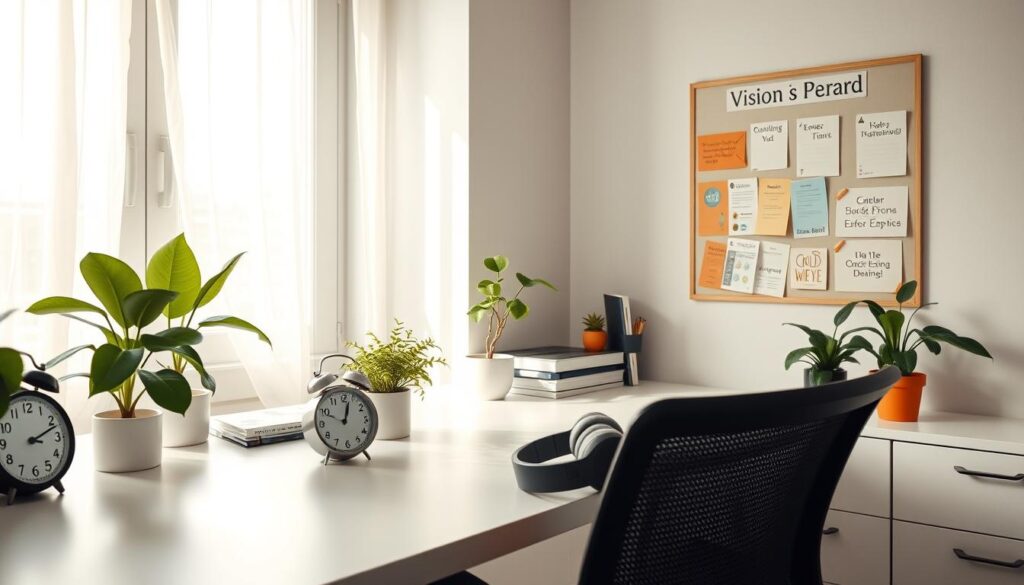
“The ability to focus is the foundation of all meaningful work.” – Cal Newport, author of “Deep Work”
Embrace Technology to Boost Efficiency
In today’s fast-paced business world, using technology can change the game. It helps improve workplace automation and efficient work habits. With the right tools and strategies, you can make your workflows smoother, reduce distractions, and boost productivity.
Productivity Apps to Consider
There are many productivity apps out there. Trello and Asana help with task management. Clockify and Hubstaff track your time. These tools can help you stay organized and manage your tasks better.
Automating Routine Tasks
Automating repetitive tasks can greatly improve efficiency. You can set up automated email responses or schedule social media posts. Tools like IFTTT, Zapier, or cloud-based apps can help automate these tasks.
“Successful technology deployment requires sustained support to ensure seamless integration within the organization.”
While technology is powerful, use it wisely. Don’t get lost in app-hopping or notifications. Choose technology that fits your work style and boosts your efficiency.
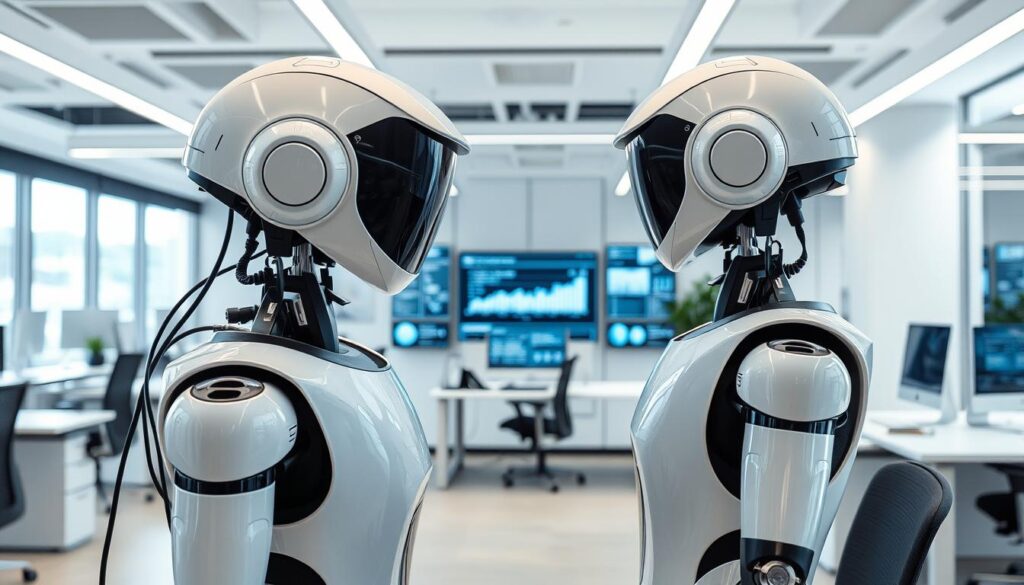
By choosing the right technology and using it strategically, you can achieve more. This will help you develop efficient work habits and succeed in your career.
Develop a Healthy Work-Life Balance
In today’s fast-paced world, keeping a healthy work-life balance is key. It helps you stay productive and happy in the long run. By focusing on work-life balance and energy management, you can reach your highest potential. This is true for both your job and personal life.
Importance of Taking Breaks
It’s vital to take breaks during the day to stay focused and energized. Research shows that short breaks can make you more concentrated and productive. Try activities like stretching, deep breathing, or a quick walk to refresh yourself.
Strategies for Unplugging After Work
Setting clear boundaries between work and personal life is crucial. Don’t check work emails or messages after hours. Use a traditional alarm clock instead of your phone to avoid distractions. Taking breaks from screens can reduce stress and anxiety, improve focus, and help you sleep better.
Remember, taking care of your body and mind is essential for success. Make time for self-care, like exercise, healthy eating, and mental health checks. This way, you’ll perform well in both your job and personal life.

“The true measure of success is how much time you spend doing what you love.” – Oprah Winfrey
Review and Reflect on Your Day
As your workday ends, take a moment to look back on what you’ve done. This daily routine can greatly improve your work habits. By seeing what worked and what didn’t, you can get better every day.
Creating a Daily End-of-Day Routine
Start a simple end-of-day routine to review your day. Make a list of tasks and mark off the ones you’ve done. Seeing your progress can boost your confidence.
Then, plan your tasks for the next three days. Focus on the most critical ones first. This helps you stay organized and focused.
Analyzing What Worked and What Didn’t
Reflect on your day to see what went right and what didn’t. Think about: What tasks did I do well? Where did I struggle with time? What surprises came up, and how can I prepare for them next time? This reflection helps you improve your work habits.
Research shows daily reviews can lower stress by 30% and boost work output by 25%. Adding this habit can lead to lasting success.
“The secret of getting ahead is getting started. The secret of getting started is breaking your complex overwhelming tasks into small manageable tasks, and then starting on the first one.” – Mark Twain
Seek Feedback to Improve Performance
Getting feedback from coworkers is a great way to find out how you can do better. It helps you learn how to work smarter and set better goals. This way, you can make your workday more efficient and productive.
Gathering Input from Colleagues
It’s okay to ask your coworkers for their honest thoughts on your work. They might see things you don’t. Ask them about your good points, what you can get better at, and how you can work more efficiently.
Using Feedback to Set Future Goals
After you get feedback, take time to think about it. Look for areas where you can improve. Use this to set clear, reachable goals for your work. This will help you make your workday better and boost your performance.
| Feedback Source | Suggested Improvement Areas | Corresponding Goals |
|---|---|---|
| Team Lead | Improve time management, reduce distractions | Implement the Pomodoro Technique, schedule focused work blocks |
| Peer Colleague | Enhance communication and collaboration | Utilize project management tools, schedule regular team check-ins |
| Client | Deliver projects more efficiently, improve responsiveness | Streamline workflows, set realistic deadlines, and improve notification systems |
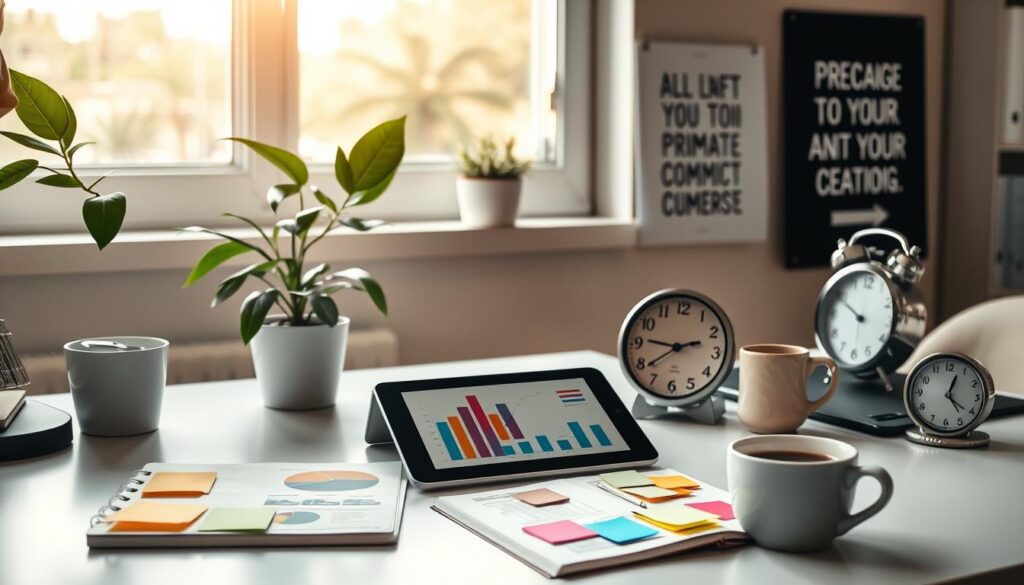
By asking for and using feedback, you can grow and get better at your job. This will make your work habits more efficient and productive.
Continuous Learning for Career Growth
In today’s fast-changing job market, learning never stops. It’s key for career growth and staying productive. By learning new skills and improving what you already know, you can lead the way to success.
Online Courses and Resources
The digital world has opened up many learning paths. Sites like Coursera, Udemy, and Skillshare offer a wide range of courses. They cover everything from technical skills to soft skills. Use these tools to grow your knowledge and stay ahead in your field.
Networking Opportunities
Networking is a great way to keep learning. Going to industry events, joining groups, or online forums can connect you with others. They can share their knowledge, offer advice, and introduce you to new ideas. Use these chances to learn from others and keep up with the latest trends.
By focusing on continuous learning, you open doors to new career growth and better productivity techniques. Adopt a lifelong learning attitude. This will help you reach your professional goals.
| Statistic | Value |
|---|---|
| 80% of employees prioritize professional development and training opportunities when considering new jobs. | 80% |
| 94% of employees are more likely to stay longer at a company that invests in their learning and development. | 94% |
| 76% of employees are more likely to stay with an organization that offers continuous training. | 76% |
“Continuous learning is the key to unlocking your full potential and reaching new heights in your career.”
The Power of Mindfulness in the Workplace
Mindfulness has become more popular for its benefits in the workplace. It helps manage your energy and boosts your workday productivity. By adding mindfulness to your daily routine, you can see big improvements.
Practicing Mindfulness Techniques
Mindfulness is about being in the moment and being aware. Here are some mindfulness techniques you can try:
- Mindful breathing: Spend a few minutes each day focusing on your breath. It helps you stay present.
- Body scan meditation: Pay attention to each part of your body. Release any tension or stress.
- Mindful movement: Try gentle stretches, yoga, or walking. It helps relax your body and clear your mind.
Benefits of Mindfulness on Productivity
Using mindfulness at work can greatly improve your performance and well-being. Here are some benefits:
- Improved focus and concentration: Mindfulness keeps you present and focused. It helps you handle tasks better.
- Reduced stress and increased resilience: Mindfulness helps manage stress. It makes you feel more calm and centered.
- Enhanced decision-making and problem-solving: Mindfulness improves your thinking and judgment. You make better decisions.
Adding mindfulness to your workday routine can change your life. It helps you stay mentally sharp and boosts your productivity.
“Mindfulness is not about thinking, it’s about being. It’s about being connected, being present, being aware of what is happening in the moment.” – Jon Kabat-Zinn
Celebrate Your Achievements
Recognizing your successes, no matter how small, can be a great motivator. It boosts your productivity. By setting up a reward system for your goals, you stay enthusiastic and driven. This fuels your efforts to make your workday better over time.
The Importance of Acknowledging Success
Research shows that feeling recognized at work makes people happier. Forbes found that 76% of people feel this way. A SHRM poll also showed that 70% of companies with recognition programs see better employee engagement.
Celebrating your wins, like finishing a tough task or reaching a personal goal, boosts your job satisfaction. It keeps you motivated.
Setting Up a Reward System for Motivation
Creating a personalized reward system can keep you motivated and on track. Studies from the University of Texas show that individual rewards are more effective. Tailoring your rewards to your likes and achievements boosts your sense of accomplishment.

